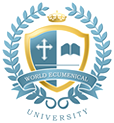Religious Sciences
Program Objectives
The Stricto Sensu Postgraduate Program in Religious Sciences aims to qualify its students for research and teaching in the area of Religious Sciences.

The Master’s Program has the following specific objectives:
a) To Award, for the student, the Master degree on religious science
b) Train teachers and researchers to work in higher education institutions, religious institutions and governmental and non-governmental organizations;
c) To Contribute to the continuing development of research in religious sciences, especially in the area of religious phenomena;
d) To stimulate the capacity of investigation and to improve the professional formation by means of the development of methods of investigation around the religious phenomenon;
e) To stimulate systematic reflection and the production of research on religion and religiosity in an interdisciplinary and confessional perspective;
f) To consolidate the World University Ecumenical as a reference in religious science research at the international level.
History
The Stricto Sensu Graduate Program in Religious Sciences has its origin in the nature of fully educating its students, articulating science and profession, with ethical-Christian values. The University offers to the students theology, philosophy and humanities subjects, exceeding the specificity of the chosen professional area. Accompanying this initiative is the pedagogical and epistemological strengthening of the Theology, Philosophy, Social Sciences and History courses, in which religion is one of the central elements in their respective curricula.
It also has its origin in the development of research carried out within research groups, considering religion as an object of philosophical, theological, historical and sociological research. This scientific production was based on both the theoretical foundation and the universal religious reality, markedly plural in terms of religious confession. Given this, the Program was organized around an area of concentration entitled “Universal religious plurality”, with two lines of research: “Religion and its epistemological dimensions”; “Religiosity: institution and plural practices”.
The first line aims to highlight the concept of religion in contemporary thought and a whole set of elements that arise from the search for conceptualization, carried out in the context of modernity and postmodernity, while the second deals with the analysis of the elements contained in first, present in the symbols, rituals and texts of ecclesiastical and secular religious institutions, thus infringing the way in which these institutions relate to society and culture and their discursive practices.
Target audiences
– Holders of higher level diplomas in Theology, Social Sciences, History, Philosophy, Education, Psychology and related areas.



